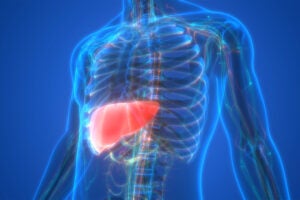Tag: proteins
-
Health
The machinery of hearing
New research not only sheds new light on how hearing works, but could help clarify how it deteriorates over time.
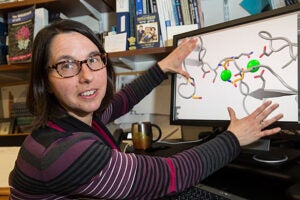
-
Health
Brains or skin?
A protein that is necessary for the formation of the vertebrate brain has been identified by researchers at the Harvard Stem Cell Institute (HSCI) and Boston Children’s Hospital, in collaboration with scientists from Oxford and Rio de Janeiro.
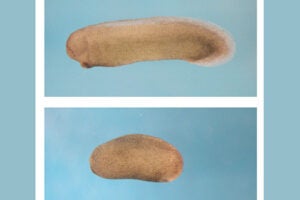
-
Science & Tech
Negative plus
Led by Professor David Liu, a team of researchers has developed a technique to continuously evolve biomolecules that uses negative selection — the ability to drive evolution away from certain traits — to create molecules with dramatically altered properties.

-
Science & Tech
Evolutionary oomph
Scientists may soon be able to turn to one of the most powerful forces in biology — evolution — to help in their quest to develop new synthetic polymers.
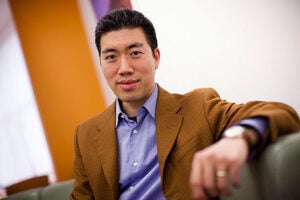
-
Health
A hidden genetic code
For decades, scientists wondered whether there was some subtle difference between parts of the genetic code that, while different, appear to encode the same amino acid. Harvard researchers now have the answer.

-
Health
Turing was right
Researchers at Harvard have shown that Nodal and Lefty — two proteins linked to the regulation of asymmetry in vertebrates and the development of precursor cells for internal organs — fit a mathematical model first described by Alan Turing six decades ago.
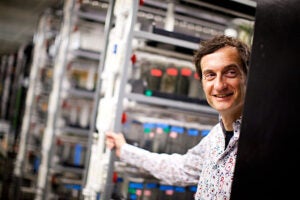
-
Science & Tech
Molecules as motors
Scientists from around the world gathered at the Radcliffe Institute for Advanced Study Oct. 14 for a symposium on advancing efforts to study and design molecules as motors.

-
Health
RNA dynamics deconstructed
RNA plays a critical role in directing the creation of proteins, but there is more to the life of an RNA molecule than simply carrying DNA’s message.
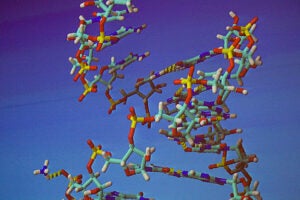
-
Health
Beyond DNA
On a day when Harvard celebrated the accomplishments of the Human Genome Project, the Radcliffe Institute hosted a scientist whose work focuses not just on DNA, but on the mechanisms that control its expression.
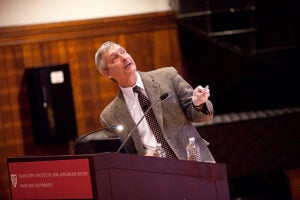
-
Health
Spinal fusion protein associated with complications, higher costs
In the United States, back pain continues to be a leading cause of disability and one of the most common reasons to see a physician for evaluation. Among various treatment…
-
Health
Cancer chemotherapy: An unfolding story
To launch his lecture on cancer chemotherapy, Luke Whitesell ’79, RI ’06 displayed an image of an origami crab: a double visual metaphor. The crab is the traditional symbol of…
-
Science & Tech
Carol Robinson: Pushing a technology’s boundaries
The distinguished chemist Carol Robinson has used mass spectrometry throughout her career to tackle increasingly complex problems in biology. When she delivered the Radcliffe Institute’s first Lecture in the Sciences…
-
Science & Tech
Dinosaur protein preserved over time
Ancient protein dating back 80 million years to the Cretaceous geologic period has been preserved in bone fragments and soft tissues of a type of duck-billed dinosaur, according to a…
-
Science & Tech
Researchers find new molecule to block ‘Hedgehog’ signaling in cancer, development
Researchers have achieved a feat drug developers had thought difficult, if not impossible, discovering a compound that blocks the functioning of a key developmental protein by binding to an “undruggable”…
-
Science & Tech
A protein found to restore blood glucose in type 1 diabetes model
A protein made by the liver in response to inflammation and used to treat patients suffering from a genetic form of emphysema has been shown to restore blood glucose levels…
-
Campus & Community
Comprehensive model first to map protein folding at atomic level
Scientists at Harvard University have developed a computer model that, for the first time, can fully map and predict how small proteins fold into three-dimensional, biologically active shapes. The work…
-
Campus & Community
Researchers discover mechanism that regulates bone growth
Harvard researchers have identified a protein that helps regulate bone growth and may lead to new drug targets to fight osteoporosis, the bone loss condition that the National Institutes of…
-
Science & Tech
Discovery of calcium channel protein illuminates T cell signaling
A rare genetic defect in a family has helped researchers identify a key signaling component in T cells. The newly identified protein, Orai1, may be a piece of a long-…
-
Campus & Community
Evolution follows few possible paths to antibiotic resistance
Darwinian evolution follows very few of the available mutational pathways to attain fitter proteins, researchers at Harvard University have found in a study of a gene whose mutant form increases bacterial resistance to a widely prescribed antibiotic by a factor of roughly 100,000.
-
Health
Enzyme key in preventing Alzheimer’s onset
A new discovery has found that Pin1, an enzyme previously shown to prevent the formation of the tangle-like lesions found in the brains of Alzheimer’s disease patients, also plays a…
-
Health
Protein underlies brain’s response to activity
Experience helps shape the brain, but how that happens – how synapses are remodeled in response to activity – is one of neurobiology’s biggest mysteries. Though axons and dendrites can…
-
Arts & Culture
Controlling long-term memory
Harvard University biologists have identified a molecular pathway active in neurons that interacts with RNA to regulate the formation of long-term memory in fruit flies. The same pathway is also found at mammalian synapses, and could eventually present a target for new therapeutics to treat human memory loss.
-
Science & Tech
Early steps discovered in protein-making process
Translation, the synthesis of protein from an mRNA template, has long been considered a benign sequela to transcription. After all, dysregulation of transcription causes a multitude of human disorders, including…
-
Health
Brain protein may play role in innate and learned fear
In a paper published in the November 2005 issue of Cell, researchers reported that the protein stathmin is essential for the fear response – both the expression of innate fear…
-
Campus & Community
Bulyk searches for DNA on-off switches
Martha Bulyk held what looked like an ordinary glass slide up to the large window that is much of one wall of her Harvard Medical School office. The slide seemed…
-
Campus & Community
Preparing the first ‘Who’s Who in Proteins’
Proteins gone wrong cause most human diseases. Find these mutated proteins, scientists reason, and they are on the way to predicting who will get what disease. They would also learn…
-
Health
Learning how the SARS virus spikes its quarry
Structural images that show how the SARS virus’s spike protein grasps its receptor may help scientists learn new details about how the virus infects cells and could also help in…
-
Health
Critical step traced in anthrax infection
An anthrax bacterium secretes three nontoxic proteins that assemble into a toxic complex on the surface of the host cell to set off a chain of events leading to cell…
-
Campus & Community
Researchers ID antigen for type 1 diabetes
Type 1 diabetes, diagnosed in children and adults, is an autoimmune disease that occurs when the pancreas no longer produces insulin. Diabetes, which ranks as the fifth-deadliest disease in the…
-
Campus & Community
Repairing DNA damage
Scientists have discovered some fascinating details about a handy repair service in your genes that that not much is known about. It searches through the huge amounts of DNA in…


